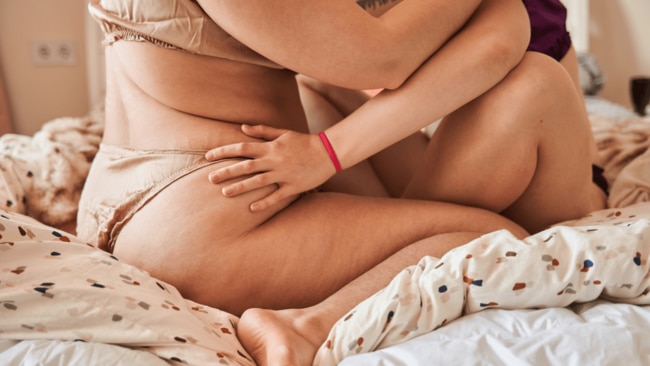Is it possible to have a healthy romantic relationship without sex?
The experts weigh in
Lifestyle
Don't miss out on the headlines from Lifestyle. Followed categories will be added to My News.
Just because you're not jumping into bed and tearing each other's clothes off, that doesn't mean your relationship is necessarily headed for disaster.
Please note this article references sexual assault.
Imagine this: your friend tells you that she and her long-term partner only have sex once a year, if that.
How do you react? I’d hazard a guess that you’d probably feel concerned for her, that her sexual needs aren't being met and that a lack of sex means something must be wrong in their relationship. It would be a fair reaction because it aligns with our mainstream view of what a healthy relationship looks like.
It’s a pretty mainstream belief that sex is super important in a romantic relationship. It’s just something that we do. It’s also something that — if we’re not having it — we see as a signal of a relationship breakdown. In the mainstream monogamous heterosexual relationship structure, that is.
Like what you see? Sign up to our bodyandsoul.com.au newsletter for more stories like this.
For me, sex is important in a romantic relationship. Sex is one of the ways I like to bond with a partner, it helps me feel closer to them, empowered by them and confident within myself — which is also really important for me to feel validated in the relationship.
“Every individual has their unique sexual blueprint,” Adelaide-based sexologist, Jamie Bucirde, tells Body+Soul. “There’s no right way to engage with sex or be in a relationship.”
“For people whose love language is physical touch, sex can be super important for them to express and experience their wants, needs and desires.”
As someone who experiences physical touch as one of their main love languages, I understand this. However, for me, it’s one I’m growing back into after an experience of sexual assault in high school. I didn’t realise it at the time, but my body shut down as a way of responding to the trauma — dealt with by one of my best friends’ boyfriends, after spiking my drink at a house party.

For years after this, from age 17 to 24, I had a visceral response to being physically touched. Something as innocent as a comforting hug from a friend would make me shiver. Now, after years of therapy and a few beautiful experiences that have helped me regain my trust in the beauty of physical connection, I’m super protective over my love and desire for sex and physical intimacy.
So, when my friend recently told me that she and her partner only have sex once a year and — although she’s a super sexual person — she was okay with that… I had some questions.
“He ticks 99 out of 100 boxes,” she said, as a way of an explanation. “He’s so patient, understanding, caring, reliable, genuine… and so many other things.
“Above all, he’s not a player. He genuinely only has eyes for me. And I feel safe in that.”
I can see her perspective, as I often think that we expect a lot from our romantic partners. In this modern relationship era, we expect these 'the one' relationships to give us love, romance, sexy times, companionship, support, and dependability…it's no wonder that dating can be such a challenge.
Especially as women, we feel this new pressure to 'not settle', which can sometimes arguably mean putting extra and unnecessary pressure on our relationships.

“As humans, we engage in different types of relationships; romantic, sexual and emotional,” says Bucirde.
And while some of these — such as emotional relationships — we might get from our friends, they can also be the way we feel most aligns with us in a romantic relationship, too.
“If we look at these three relationship styles as a triangle, and separate them into three points; we can see that they’re all different. They can live on their own or they can be merged, there is no right formula.”
A clear example of this is asexuality. In the words of asexuality activist and writer Caroline Cull, asexuality is ‘when you experience little to no sexual attraction’.
“For many, the buck stops there and they continue to have sex lives for sole physical pleasure or release, but there are many people who don’t experience the need for sex at all. Many asexual people find other ways to be intimate, and it goes from person to person,” she explains.
As someone who identifies as Aromantic Asexual, Cull experiences little to no romantic attraction and feels her needs are met by feeling respected and cared for by a partner.
“Communication is always key too,” she adds. “If you aren’t sharing with your partner what your needs are, they might never be met. My love language has always been words of affirmation and quality time; never physical touch. My partners respect it because I’m upfront and honest from the start.”

Here we have three different examples of how individual women seek to engage in a romantic relationship. While I feel sex is a highly important part of my romantic experiences, my friend sees other qualities in her partner as a higher priority, and Cull doesn’t experience the need for physical intimacy at all.
Although these experiences are vastly different, they are a testament to just how individual our experiences are as people, and therefore; in relationships.
“We have the power to create relationship structures that fit everyone’s needs and understanding that is truly liberating,” says Bucirde.
“There’s no right way to be in a relationship with someone and it’s never too late to start working with your partner to see what works best for your dynamic.
“It’s a really exciting process that we can and should take in our relationships and one that is (thankfully) becoming a lot more normalised in mainstream society.”
Bucirde also encourages as much learning as possible.
“Knowledge is power. You need to understand your sexual blueprint; what you’re currently comfortable with, and what you’re open to and keen to explore.
“Putting yourself first and understanding your desires and boundaries is integral in being able to communicate your needs to someone else, which is the most important part of creating the relationship you want.”
I went back to my friend and asked her if she felt like she was compromising her needs by not having an active sex life with her long-term partner. Her response surprised me.
“Sex doesn’t mean much to me emotionally,” she said.
“I spent a decade being single and I enjoyed sex for its physicality, but it didn’t do much for me emotionally. I have a great relationship with self-pleasure, and that’s where I derive emotional pleasure; from my sexual relationship with myself.”
“I may feel this way because I’ve never really experienced ‘making love’, but I’ve accepted it and that’s how it is.”

So, if she doesn’t feel inclined to ask for more sex in her relationship and is content with self-pleasure as a way of physical connection, who am I to question her?
Despite my personal need for physical intimacy, my internalised alarm bells at her acceptance of no sex highlight just how much value we place on it as a society. And, while the importance aligns with me in some ways, it doesn’t ring true for everyone; and that’s okay.
“Many people can’t fathom a relationship without sex because it’s so personally intrinsic and connected,” says Cull. “We’re conditioned from a very young age to believe that “sex sells” and if we’re not inherently sexual, we then lose our value.”
“I’ve been in many loving relationships where we didn’t even kiss. We just cared for each other and we were each others’ person.”
I think that part of existing in modern conversations about how we connect is understanding that it’s a constant evolution and that no two experiences are the same. As we begin to find our voice, learn more about our needs as individuals and find the words to ask for what we want, we’ll change and grow.
So sure, while we can share our stories and create new sub-languages, we should — as Burcirde encourages — focus on creating our own “sexual blueprint”.
And the beauty of that is that it can look however you want and change as often as you please. It’s a reflection of you.
More Coverage
Originally published as Is it possible to have a healthy romantic relationship without sex?




